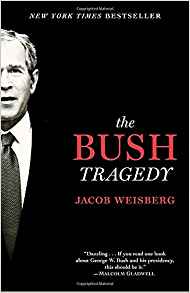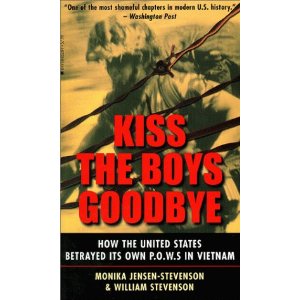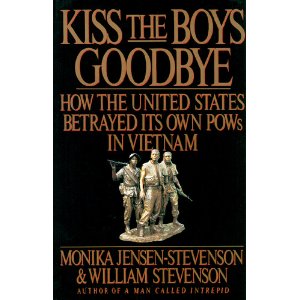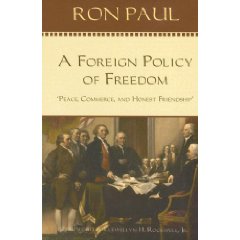
Unique, in a class of its own
February 13, 2008
Jacob Weisberg
This is a rather unusual book, one that takes a clever approach of seeking to understand Bush Junior in the context of a Shakespearian tragedy, and specifically, Henry V.
Here are my flyleaf notes–this is a totally worthy book by a real professional with insight.
+ Three myths of the House of Bush:
– Made it on my own
– Not really rich
– Running for office to serve the Nation
+ Seven Lessons from the House of Bush
– Treachery of the press
– Importance of moment
– Money before politics
– Primacy of manners
– NE moderates an endangered species
– Don't give up
– Trust only the family
+ The author opens early with his conclusion that George Junior is a Walker (the differences are explained), not a Bush and the rest of the book is a lovely explanation of a family tragedy in three acts:
– ACT I: the loser struggling to be like Dad and failing
– ACT II: success at being different (drunk, boorish, inept, but different)
– ACT III: descent into mesianism (what happens when a village idiot gets the illusion of power)
+ Early on I have a note: national and global catastrophe rooted in a broken family whose black sheep got promoted more than one rung too far. It must gall the second fiddle that his own mother does not like him and thought the Presidency should have gone to Jeb.
+ Despite my extensive reading on the last eight years of high crimes and misdemeanors, this book contains information I have not seen before. The author hits the reader early on with:
– Rove, Cheney, Rumsfeld, and Rice were “enablers” for George Juniors' idiocy (Powell in my view confused loyalty with integrity)
– The second term flame-out was avoidable–Bush had good intentions but Rove held sway
+ The author addresses Bush's faith as false, non-theological, more like “self-help Methodism,” using Alcoholics Anonymous meetings instead of church as a group activity.
+ There is a superb discussion of the juxtaposition of Bush's linguistic blunders combined with the manner in which he was gifted at using evangelical and conservative code words.
+ There is fine coverage of George Juniors meanness and overbearing humiliating toward all, Rove in particular, who accepted every humiliation, including the nickname “Turd Blossom.”
+ The author summarizes the scandals on Rove's watch: Plume, Katrina, Iraq, firing of prosecutors (I would also add, subversion of Congress in violation of Article one, see Breach of Trust and also Broken Branch).
+ We learn in passing that Rove was abandoned three times:
– By his father who ran away
– By his stepfather who ran away (one of the two was homosexual, I forget which)
– By his mother who committed suicide
+ It was Rove, the author tells us, who pushed privatization of social security. As I review this book there are ads on the radio that seek to communicate that 40% of America's shares are owned by normal people. What they do not tell you, which you can lean in John Bogle's book, The Battle for the Soul of Capitalism, is that we are no longer an ownership society, we have abdicated to financial management intermediaries, and they have skimmed one fifth of the value off for themselves, a select few.
+ According to the author it was Rove and not George Junior that pressed for a strategy of demonizing terrorism. The author says Rove destroyed the Bush II presidency with the “catastrophic blunder of politicizing the War on Terror.”
+ When the author finally gets around to covering Dick Cheney he casts him perfectly as “Lord Chief Justice” from Henry V, the sycophant who revels in pulling the strings behind the scenes. I have the line, my own interpretation of the author's words, “played Bush like a fiddle.”
+ The author asserts that Cheney was not transformed, as Brent Scowcroft believes, but rather finally found an opportunity to exercise his own judgment about the irrelevance of Congress and the need for a unilateral Presidency autonomous from oversight and able to take bold initiatives without consultation. [See One Percent Doctrine for a review of Cheney's mal;feasance going back to the Ford Presidency, in ursurping Presidential power].
+ The author, editor in chief of Slate, observes that the press really missed this about Cheney, his intent focus on expanding Presidential power and dismissing Article 1 of the Constitution.
+ The author reminds us that Cheney went from intern to Chief of Staff of the White House in 6 years, and I cannot help wondering what pathologies came from too much power too soon (see The Pathology of Power – A Challenge to Human Freedom and Safety)
+ Addington receives concise but chilling coverage.
+ Pages 170-171 are a priceless summary of how Cheney
– Managed Bush's mind
– Framed choices
– Accelerated Bush's neurotic shoot from the hip uninformed decision making (while ensuring behind that Cheney's decision was preset or, if necessary, counter-manding the President behind his back after the fact, alleging to others not in a position to question, that President had changed his mind).
+ The author discovered in Lynn Cheney's “Executive Privilege” (evidently no longer carried by Amazon) a telling fictional tale all too real.
+ The section I found most interesting outlined the six phases of Bush Doctrine:
– 1.0 Unipolar Realism (we make reality in our own image)
– 2.0 With us or Against Us
– 3.0 Preemptive attack
– 4.0 Democracy in the Middle East
– 5.0 Freedom Everywhere
– 6.0 No doctrine at all
+ The author surprises me with one defense of Cheney that I consider credible: Cheney truly wanted to vaccinate the entire nation against smallpox because he truly believed the threat existed. I am reminded of Daniel Elsberg who in Secrets: A Memoir of Vietnam and the Pentagon Papers recounts how he warned Henry Kissinger that reliance on Top Secret Codeword information would “make him like a moron, unable to listen to those who actually know.”
+ The author tells us that Bush II reads books many of them “but does not know how to think historically.” I am reminded of my youngest son, 12 years old, a brilliant wide receiver and first baseman, who at this point can read a book and not remember a thing from the plot.
+ The author ends with a devastating comparison of Winston Churchill, who did outgrow Lord Randolph and make his mark, and George Junior who “in the end, … failed to be his own man or displace his father.” Naturally there is the humiliating irony of proving that his father was right not to have gone on to Baghdad.
I just shake my head wondering how the American people have been so silent. Here are a few other books that round out the catastrophic decrepitude of the Bush-Cheney regime:
Vice: Dick Cheney and the Hijacking of the American Presidency
Weapons of Mass Deception: The Uses of Propaganda in Bush's War on Iraq
Breach of Trust: How Washington Turns Outsiders Into Insiders
Running On Empty: How The Democratic and Republican Parties Are Bankrupting Our Future and What Americans Can Do About It
A Pretext for War : 9/11, Iraq, and the Abuse of America's Intelligence Agencies
Losing America: Confronting a Reckless and Arrogant Presidency
Some time a go I wrote a piece on 9/11, “who's to blame,” and it boiled down to this: We the People are to blame, for having dropped out of the democracy and abdicated our civic responsibilities. Cheney's high crimes and misdemeanors, not least of which was letting 9/11 happen as FDR let Pearl Harbor happen, Congress abdicating its Article 1 responsibilities, the mainstream media refusing $100,000 fully paid ads against the war; a piss-ant like Wolfowitz being able to get away with questioning Shinseki's experience, insight, and honor–all of these are secondary causes and I would hasten to include the “failure of generalship,” flag officer who, like Colin Powell, forgot their Oath of Office and confused loyalty with integrity. The prime cause is that we gave our government over to what I now consider to be four organized crime families: the Clintons, the Bushes, the Democratic Party, and the Republican Party.
As McCaffrey said on CNN last night (13 Feb 08), “anyone who votes for an incumbent in 2008 should lose their American citizenship.” Tongue in cheek? Perhaps. Relevant and actionable? Absolutely. It's time to abolish this government and start over.










